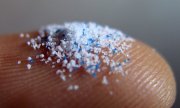Every step counts
A general ban on microplastics would be good for consumers, Aamulehti contends:
“In the UK the use of microplastics has been banned since the start of the year and Sweden has taken the same decision. ... In Finland it's still a voluntary issue. ... It would be feasible to completely ban the use of microplastics. This is being considered in the EU. It would make life easier for many consumers. Although green cosmetics have been trendy for several years now and the availability of such products has considerably improved, consumers have to get active, inform themselves and invest time and effort to find environmentally friendly products.”
An opportunity for Finland
The fight against microplastics could open up major economic opportunities for Finland, Iltalehti is convinced:
“Cosmetics and detergents generate far fewer microplastics than tires, road surfaces, synthetic turf and textiles. The microplastics problem could be reduced by one-third if natural or cellulose fibres were used for functional clothing instead of polyester. Consumers must become more aware of the fact that with every wash fleece sheds 200,000 microfibres, each just half a millimetre long. Clearly a natural market will develop for wood-based, sustainable textile fibres developed in Finland.”

